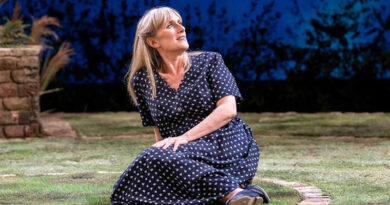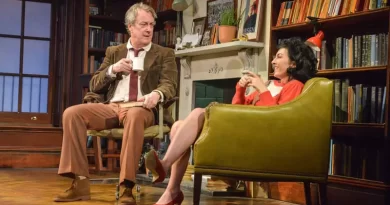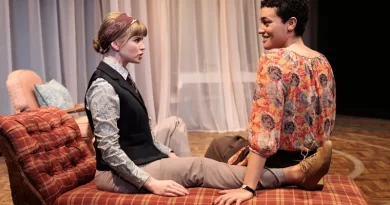“Love”, Park Avenue Armoury
Glenda Frank on the Upper East Side
18 March 2023
At first the title Love seems bizarre, misleading, even ironic for a play set in a cramped shelter for the homeless. Love is a British import, the middle play of Inequalities, a trilogy by Alexander Zeldin that began touring Europe in 2016 and is currently on a tour of the United States. The Wade Thompson Drill Hall, the performance space at the Park Avenue Armory at 67th Street, has once again been reconfigured so that some of us, seated on stage, are silent residents of the shelter. And for 90 minutes with no intermission! Other audience members are in traditional seating.
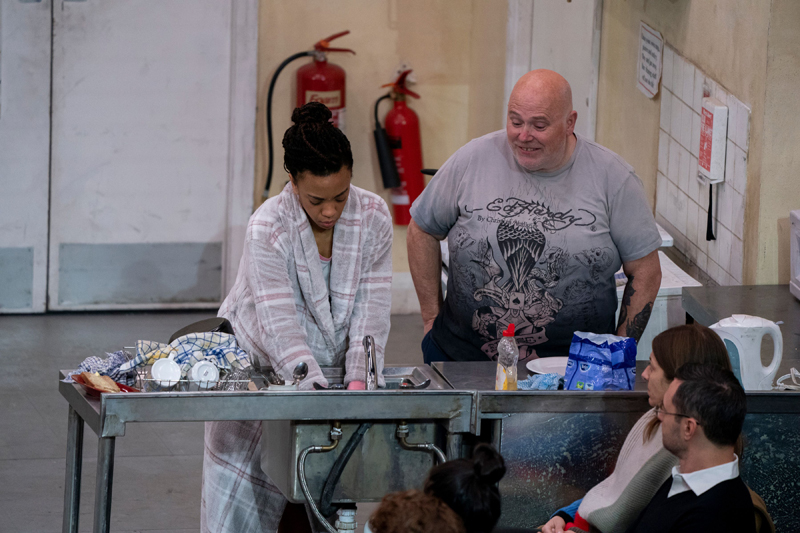
Janet Etuk and Nick Holder.
Photo credit: Stephanie Berger Photography.
We have time to get to know the occupants. An unemployed man and his failing mother share Room 4. Next door in Room 5, live a father with two children from a former relationship and his pregnant partner, Emma. We acquire a nodding relationship with Room 6, a homesick immigrant whose family is home in the Sudan, and Room 8, a man who had been a teacher in Syria. There is one bathroom for everyone. The bathroom sink is broken and we glimpse piles of toilet paper near the overstuffed waste basket.
The small kitchen contains a stove, a sink, and a mini-fridge, which everyone has to share, and one small, locked cabinet per unit. Some share better than others. People eat quickly at one of the two tables and return to their rooms. The lack of privacy and space are ever-present problems.
The residents are people like us. There are no addicts, no criminals, no one who needs a physical intervention or heavy medication. The family was evicted when the landlord raised their rent. Paige, the eight-year-old, wears a school uniform and is excited as she practices her role for the school’s Christmas pageant. Her brother is withdrawn and angry; his solace is rap music with lyrics far too graphic for a 12-year-old.

Emelda Brown as Barbara.
Photo credit: Stephanie Berger Photography.
As for the title – love is both their salvation and their burden. Emma, the central figure of the play, is desperate to move so that her child is not born in the homeless shelter. Dean, her partner, tries frantically to work within the system but the system is deaf. He missed a meeting with the employment counsellor on the day they were evicted so the family funds were cut. Legally every resident can occupy the units up to 6 weeks before relocation, but the people in Room 4 have been there for a year. Emma and Dean’s baby inspires hope in their neighbour, yet there is no space for an infant in their crowded room.
Love is also why Colin and his mother are in Unit 4. When they explored nursing homes for his mother, they were horrified to find an elderly woman tied to a chair, covered in urine and excrement. Colin’s mother cannot control her bowels. She has an accident that routes all the tenants from their shared dining space. Colin hurries his mother to the bathroom to wash her. Emma is furious that he is not cleaning the floor, berating him for the foul-smelling mess, but finally she cleans it herself. It’s hard to love they neighbour as thyself.
Weather is important – as forecast and as metaphor. Outside it is windy and frequently raining. Colin’s mother likes to watch the wind shake the tree in their one window. The family’s only escape is to a nearby park where Dean plays with the children. Weather is also part of the irony. There is one picture in the spartan dining area of a tall, slim couple dancing in a downpour while their maid and butler hold umbrellas up to shelter them. The umbrellas barely cover the couple, but it’s obvious that the servants are feeling the storm.
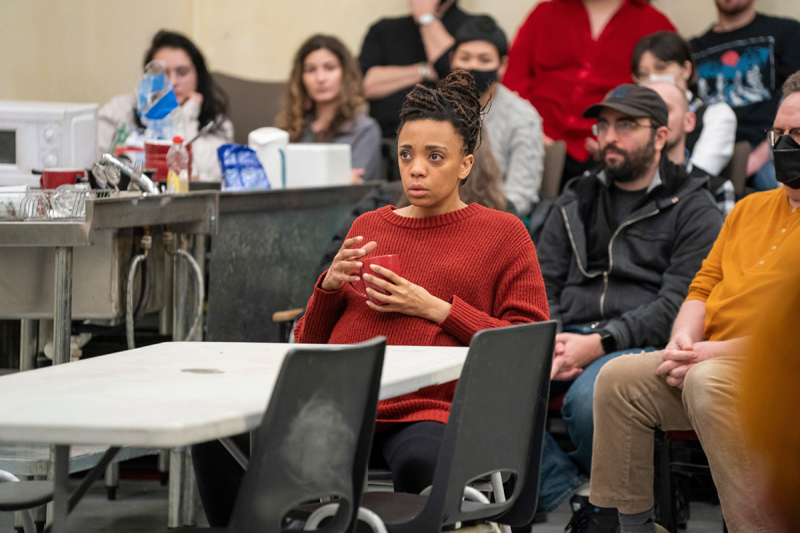
Janet Etuk as Emma.
Photo credit: Stephanie Berger Photography.
The vicissitudes of weather are continually beating down the residents of the homeless shelter. They have no protection. At times they don’t even have hope, but they have love, the last remaining shelter. It’s not quite enough.
Performances and direction were outstanding. Alex Austin (Dean) seemed increasingly haunted, the face of Despair. Janet Etuk’s (Emma) is a delicate actor with a very impressive emotional range. Nick Holden’s Colin was at once menacing and vulnerable. Director Alexander Zeldin kept the stage alive while creating at once a sense of drama and verisimilitude.
Despite the many strengths of the production, I had problems. The script by Alexander Zeldin offers generic characters who remained distinct from actual beings. We never hear about Colin’s mother forgetting her medication. We never hear about Colin’s mother having been prescribed medication. It’s a small detail but details make characters come alive.Does Emma in her last weeks of pregnancy experience back pain? Does Dean have ulcers? We do see Colin’s empty beer bottles, but never see him tipsy or hear his neighbors complaining that he smells of drink.
Love seemed like a worthy project, but I was astonished to hear British accents in a play presented to an American audience. I traveled that day in a subway car with a homeless parent begging for food. Keeping the play set in the United Kingdom seems at best lazy, if not indifferent. Dion Boucicault altered the title of his play The Poor of [New York] to reflect the location of each production. Touring musicians greet audiences with references to their city. Why offer us possibly outdated information about the poor overseas when we are undereducated about the displaced in our city?
Toward the end of the production, Colin’s mother extended her hands to the audience on stage as though she could not keep her balance. We each extended ours and she made her way from centre stage through us to the aisle, stage right. As we walk the city street and notice someone sleeping on the steps of a church or outside a restaurant asking for a meal, most of us do not extend our hands.
And another question? How much of the money raised by this production will go to the homeless? Does the play build empathy for the homeless or does it exploit them?




